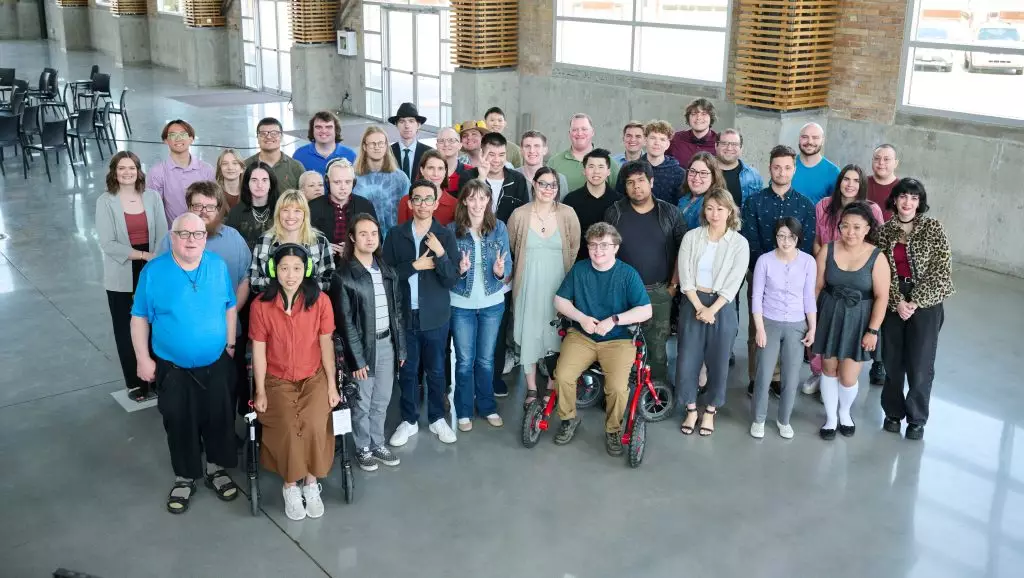The Canadian Broadcasting Corporation (CBC) is on the brink of a transformative era, poised to redefine how interviews are conducted and the dynamics that shape public discourse. With the introduction of “The Assembly,” an innovative interview format that engages a group of atypical interviewers, primarily individuals on the autism spectrum, CBC is breaking barriers and fostering understanding in society. This show is a bold testament to inclusivity while elevating the standard of televised interviews from mere celebrity encounters to deeper, more meaningful dialogues.
What sets “The Assembly” apart is not just its unique concept but its execution through a six-part series featuring prominent Canadian figures such as Jann Arden and Howie Mandel. Each episode presents an opportunity for these celebrities to confront genuine questions posed by individuals whose perspectives often go unheard. By doing so, the series challenges the traditional views of interview dynamics, notably privileging authenticity over scripted responses. The essence of interviews should not just be about the celebrity’s life but rather about how they interact with and respond to the experiences and viewpoints of others.
Global Inspirations and Local Adaptations
The roots of “The Assembly” can be traced back to the French series “Les Rencontres du Papotin,” which successfully turned the conventional interview format on its head. With a lauded history of featuring guests such as Emmanuel Macron and Antonio Banderas, the French version has proven that such formats can elicit genuine reactions and conversations that resonate on a deeper level than what typical celebrity-focused programs offer. The success of these adaptations implies a growing global appetite for authentic storytelling that transcends mere entertainment.
CBC’s decision to adapt this format showcases its commitment to fostering community and understanding through diverse narratives. The importance of engaging voices from all walks of life cannot be overstated; it has the potential to challenge stereotypes and illuminate the experiences that make up the Canadian tapestry. Notably, Radio-Canada’s concurrent project, “Facteur A,” exemplifies the nurturing of cultural dialogue across linguistic divides, underscoring how media can bridge gaps and promote understanding within our complex society.
A Rich Tapestry of Upcoming Programming
Alongside “The Assembly”, CBC has announced an exciting lineup of new unscripted shows including “Locals Welcome,” which centers around lesser-known culinary treasures, and “Must Love Dogs,” highlighting the compassionate work of dog rescue. These shows, interlacing community, love, and authenticity, reflect a growing trend in broadcasting that seeks to engage audiences not through sensationalism, but rather through relatable stories that make viewers feel connected.
Additionally, the decision to revive and continue successful programs such as “Dragon’s Den” and “The Great Canadian Baking Show” attests to CBC’s understanding of the value found in consistency and familiarity for its audience. While new formats foster fresh conversations, these returning favorites provide a warm sense of nostalgia, reminding viewers of the network’s long-standing relationship with Canadian culture.
The Implications for Canadian Serials
The eclectically rich programming slate speaks volumes about CBC’s dedication to promoting Canadian talent and stories. By weaving together intriguing new formats with beloved classics, CBC is setting itself up as a foundational cultural institution that embraces both innovation and tradition. With shows acquired from international markets like “Rise of the Ravens” and “Colin from Accounts,” CBC is not just curating content but actively participating in a global dialogue about media representation and storytelling.
As Barbara Williams, CBC’s Executive Vice-President, remarked, “For generations, CBC has been here for Canada.” This sentiment reflects the critical role that public broadcasting has in representing Canadian perspectives by both celebrating diversity and providing platforms for underrepresented voices. The quest for authenticity and relatability in storytelling could very well stimulate a renaissance in Canadian television, prompting other networks to rethink their engagement strategies with audiences at large.
Through these bold programming choices, CBC has undeniably positioned itself as a pioneer in the evolving landscape of media. It goes beyond mere entertainment; it ventures into territory that encourages empathy, understanding, and deeper connections in an increasingly polarized world. As CBC launches its ambitious plans, Canadians have much to look forward to—a new age of television where every voice is valued, and every story matters.

